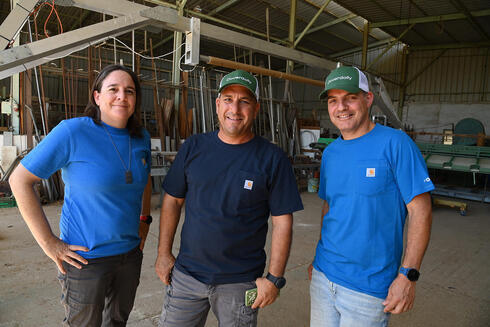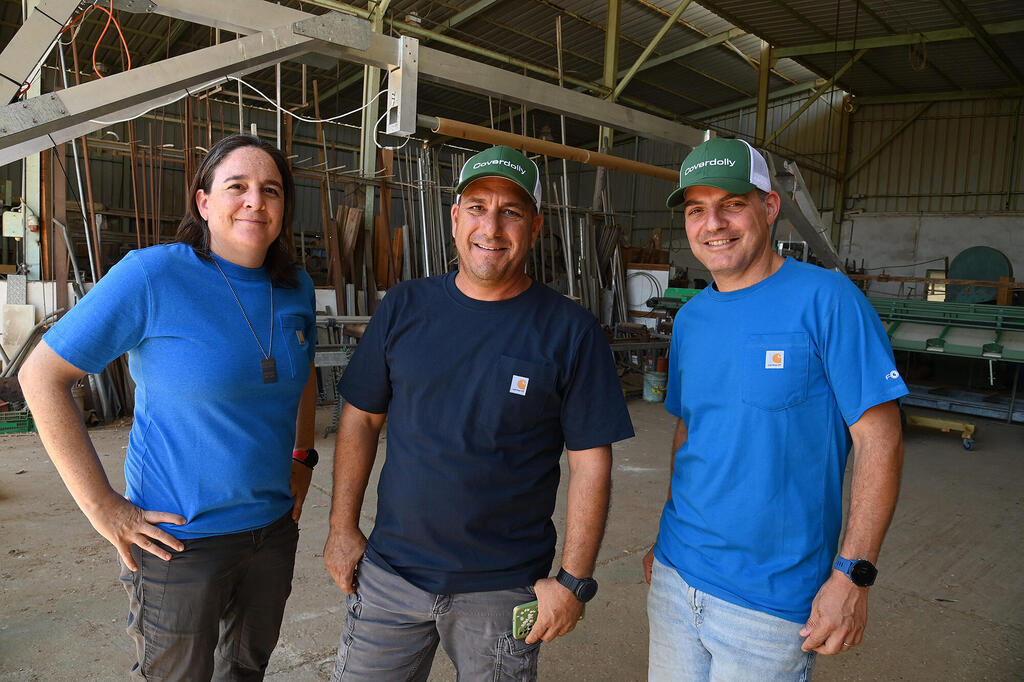
Wartime entrepreneurship: The Israeli startup tackling a global agricultural challenge
As rockets rained down, Ora Peled Nakash received a call from a friend struggling to cover greenhouses in wartime. Inspired by the crisis, she founded CoverDolly with Gilad Meller and Ahi Sitbon, a startup developing an automated solution to make greenhouse covering easier and more efficient, even in extreme conditions.
There are stories that can only be told in Israel. Ora Peled Nakash, CEO of CoverDolly, is a resident of Kibbutz Ramat David in the Jezreel Valley. Speaking to Calcalist from the shelter where she has been staying for several days due to the heavy shelling in her area, she shares the story of her company's founding.
CoverDolly, which is developing an automated machine to cover greenhouses with sheets, was established shortly after October 7 in response to the needs of a local farmer who is now a partner in the young company.
"As you can imagine, these are very busy days for me," says Peled Nakash. "On October 7, I was in my house in Ramat David in the north. A few days later, I called my friend in Moshav Dekel in the Gaza periphery, Ahi Sitbon. I’ve known him for over 25 years, since we did our year of service together. I asked how he was, and he told me that, thankfully, no one was hurt and everyone made it out safely, but he had stayed behind to keep his farm running. It was the peak of the agricultural season—tomatoes, peppers, eggplants. I immediately understood that his farm, which relies on contract work, was facing a crisis.
"The farmer had a Bedouin contractor named Osma, who was murdered on October 7 in front of his children while driving home from the moshav. The farm also had Thai laborers, some of whom fled back to their country, while others were too afraid to go out into the fields," Ora explains. "A few days later, I physically went to his farm, and at the same time, volunteer organizations started bringing people to help in agriculture. I picked crops, helped out, and also began coordinating efforts to connect volunteer help to the farmers through the civil organizations."
"Also," Ora adds, "just a few weeks before the war, I had left my career in software. I had worked at IBM for nearly a decade. I hold a degree in information systems engineering and industrial design, and I wanted to pursue entrepreneurship in climate and environmental quality. So when the war broke out, I found myself with Sitbon, the farmer, and I stayed to help create a digital volunteer system."
How did you come to found CoverDolly?
"I asked him what challenges needed to be addressed, and he told me about the problem of closing greenhouses for winter planting before the rainy season. It’s a job that used to be done by external contractors who would bring in teams of ten skilled workers to climb onto the greenhouse roof and spread plastic sheeting, which can be as large as ten meters by one hundred meters. It’s a huge challenge, especially with alarms going off, wind, and sun, and it’s not a job for volunteers. And he simply didn’t have the manpower for it. I asked him, 'Aren’t there machines that do this?' He laughed and said, 'If there’s a machine, bring it!' In other words, there’s no such product today. So I said, 'Let’s build one ourselves.'
"I called another mutual friend, Gilad Meller, an independent mechanical engineer who specializes in robotics and automation. I told him, 'You're at home because of the war. Let’s tackle this problem together and try to solve it ourselves.' And that’s how the company started.
"The three of us met during our year of service. Gilad and I served together in the Navy, and this was the first time we collaborated. We took the idea and started developing it. We received an initial investment of 200,000 shekels from the Israel Innovation Authority, and we raised additional funds from friends and family. As we spoke with more people, we realized we were addressing a real problem.
"We started with a genuine need for a friend and discovered that there’s global potential here—a solution to the global shortage of skilled labor in agriculture.
"Today, we’re working on our first prototype, and we’re getting close. We know that if a product like this exists, there will be a lot of demand. After completing the development, we plan to connect with Izhar Shay's Next October initiative" (a venture that connects young companies with good business opportunities and entrepreneurs to raise investment capital. These startups will also commemorate the fallen in the war—MO).














